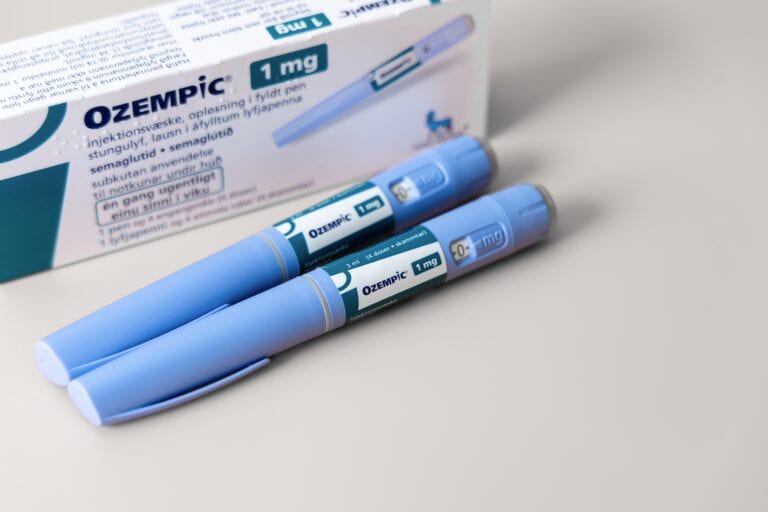As men age, they may experience changes in their bodies that can impact their sexual health and performance. One common change is the occurrence of erectile dysfunction (ED) also known as impotence. This refers to the difficulty in achieving or maintaining an erection that’s firm enough for sexual activity.
While ED does tend to become more prevalent among men over 50, it is important to note that it is not a consequence of aging. Various physical and emotional factors contribute to the development of ED.
Fortunately there are effective solutions available that can help men maintain satisfying intimacy despite the changes associated with getting older.
Erectile dysfunction (ED) is the inability to achieve or maintain an erection. Cures for erectile dysfunction can include medication, surgery, lifestyle changes, or managing underlying health conditions.
https://www.medicalnewstoday.com/articles/ed-cures-for-seniors
Table of Contents
ToggleRecognizing the Signs of Erectile Issues
The main indication of (ED) is the inability to achieve or maintain an erection that is sufficient for sexual activity. It is normal to experience this issue but if it persists consistently, it may be a sign of ED.
When should you seek Medical Advice for Erectile Dysfunction?
If you’re having trouble getting or keeping an erection during most of your sexual experiences its recommended to see a doctor without delay. Don’t feel ashamed or keep it a as secret – erectile dysfunction (ED) is a medical issue, just like any other.
It’s important to seek expert guidance to identify the cause of ED and explore treatment options to restore normal functioning. Be prepared to discuss your symptoms and medical history during appointments.
What Causes Erectile Dysfunction?
Erectile dysfunction (ED) occurs when the blood flow to the penis is restricted leading to erections. This condition is often associated with underlying factors such as medical conditions, emotional issues or lifestyle choices that interfere with the natural erectile process of the body.
Physical Causes
There are physical health problems that commonly contribute to ED by affecting circulation nerve signalling, hormone levels or tissue function necessary, for achieving erections.
- Heart disease
- Blocked blood vessels
- Nerve damage caused by diabetes or neurological conditions.
- Obesity
- High blood pressure
- High cholesterol levels
- Multiple sclerosis
- Hormonal disorders that impact testosterone production
Additionally some medications can have ED as a side effect. It’s important to communicate your symptoms with your prescribing doctors so they can explore potential adjustments if it affects intimacy.
Emotional Causes
Stress, exhaustion, depression, anxiety, and other emotional factors can also affect a person’s ability to have an erection. These conditions disrupt communication between the brain and genitals, lessen the desire for sex by diminishing the pleasure of intimacy.
Difficulties in relationships, negative body image, past experiences, grief, and struggles with self-esteem can also undermine sexual desire or performance. Persistent erectile dysfunction (ED) can then further erode confidence and relationships.
Identifying the underlying causes allows for appropriate psychological support, counselling, stress relief techniques or other methods to address these issues rather than solely focusing on physical function.
What are the Risk Factors for Developing Erectile Dysfunction?
As people get older it is not uncommon for them to experience dysfunction (ED) even if they don’t have any specific health issues. However, there are lifestyle factors that can increase the risk of facing this problem.
Additionally individuals with chronic health conditions are more likely to experience difficulties, with their erections.
Most Prominent Risk Factors
Elements putting men at greater risk for ED include:
– Cardiovascular disease: Conditions like atherosclerosis and high blood pressure that damage blood vessels or restrict circulation already disrupt erectile mechanisms. Management here is key.
– Diabetes: Over time, chronically high blood sugar levels damage nerves and blood vessels necessary for erections to occur. Careful monitoring and control of diabetes reduce this risk.
– Obesity: Excess weight stresses the cardiovascular system and increases the prevalence of heart disease, high blood pressure, and diabetes – all implicated in ED. Losing weight boosts intimacy odds.
– Tobacco Use: Smoking introduces toxins that inflame blood vessels, restricting penile blood flow. This strongly predicts earlier, and more pronounced ED. Quitting brings clear benefits.
– Stress/Depression: Chronically high stress levels disrupt hormone balance and neurological signalling tied to arousal and erections. Poor coping capacity also reduces libido and enjoyment of sex. Support here gives a boost.
– Certain Medications: Classes of drugs like antidepressants, blood pressure treatments, and antihistamines may produce ED as a side effect by influencing chemical messengers.
What is the Psychological Toll and Relationship Strain of consistent Erectile Difficulties?
Experiencing difficulties with erectile function can have a significant impact on self-confidence and emotional wellbeing. It often puts strain on relationships as feelings of humiliation, insecurity and inadequacy can arise.
Men with dysfunction may find it challenging to seek support, which can lead to withdrawal rather than seeking comfort from loved ones.
Creating an environment of openness and encouragement is crucial, for both individuals, and their relationships when dealing with dysfunction.
It is important to prioritize sensuality and maintain a sense of closeness when experiencing unreliable erections. By practicing patience and embracing creativity partners can navigate the challenges of dysfunction together in a proactive manner.
Can Erectile Dysfunction Be Prevented?
While it may not be possible to prevent the development of erectile dysfunction (ED) due to its unpredictable nature there are clear benefits in improving factors that can be modified. Adjusting lifestyle factors also helps the body in dealing with erectile issues.
Some key strategies for prevention include.
- Achieving and maintaining a healthy weight
- Engaging in physical activity
- Following a balanced and nutrient rich diet
- Managing chronic illnesses such as heart disease or diabetes
- Avoiding smoking and excessive drinking
- Reducing and effectively managing stress levels
By making these positive changes overall wellness and vascular health are enhanced, leading to optimal blood flow, for erections. Additionally these changes help lower the risk of associated conditions. Implementing measures early on maximizes their impact before aging advances or irreversible ED occurs.
How Doctors Diagnose Erectile Dysfunction?
To accurately identify ED’s cause and severity, medical professionals complete:
Comprehensive History Evaluation
Doctors ask detailed questions about current symptoms, medical conditions, medications, and lifestyle factors. Sharing intimate relationships and psychological challenges candidly provides key pieces of the ED puzzle to guide solutions.
Physical Exam
Physical examinations check for signs related to medical conditions contributing to ED risk, like high blood pressure or nerve injury. Genital/rectal exams also assess penile health and function
Additional Testing
Bloodwork evaluating cholesterol, blood sugar, and hormone status helps uncover issues requiring correction. Nighttime erection monitoring can distinguish psychological vs physical origins. Ultrasounds visualize blood flow dynamics aiding diagnosis.
Open communication with providers determines appropriate testing to reveal factors requiring attention for optimal sexual rehabilitation and satisfaction.
A Spectrum of Solutions to Regain Function
Myriad pharmaceutical, procedural, natural, and lifestyle-based therapies now effectively treat ED to restore intimacy. The best approach depends on health history, relationship status, treatment goals, and personal preferences.
What lifestyle adjustments can improve erectile function without requiring prescriptions?
When it comes to dysfunction (ED) it’s important to consider how underlying health conditions can be connected. However you don’t always need prescriptions to improve your chances of having erectile function. Making lifestyle changes can have a positive impact.
- Watch your diet: Focus on incorporating fruits, vegetables, whole grains, and lean protein into your meals while reducing intake of saturated fats, salt, sugar, and excessive calories.
- Get moving: Regular cardiovascular exercises and strength training enhance stamina but also burn calories and strengthen the heart.
- Manage stress: Adopt coping mechanisms such as meditation, maintaining social connections, spending time in nature, and taking care of yourself. These strategies help reduce the effects of stress that can contribute to ED.
- Consider supplements: Natural supplements like L-arginine, DHEA, and maca root may help in improving erection capacity, but should be carefully evaluated for safety.
By following these recommendations with patience and dedication, you can delay the need for pharmaceutical interventions while experiencing overall health benefits.
Oral Medications
This study from the National Institutes of Health dives into the science and success rates in treating ED with Phosphodiesterase type 5 (PDE5) inhibitor pills like sildenafil (Viagra), tadalafil (Cialis), and vardenafil (Levitra) successfully treat ED for most men. These drugs relax smooth muscles allowing blood vessels in the penis to dilate when aroused.
Though side effects like headache, flushed skin, or stomach upset sometimes occur initially, these typically resolve within weeks of starting medication. Finding the right drug and dose brings marked improvement for 60-70% of men. Convenience and oral administration suit many.
Injections and Suppositories
For those unresponsive to oral therapy, medications inserted or injected directly into genital structures aid erection. Alprostadil, by injection, relaxes certain penile muscles, while suppositories place the medication right inside the urethra for faster absorption.
Though more invasive than pills, 90% of men using these therapies regain erection function. Some discomfort or complications like bleeding, pain, or scarring rarely occur.
Vacuum Erection Devices
Vacuum erection devices use suction from a pump to physically draw blood into the penis to stiffen tissues. A constriction ring placed around the base of the penis after pumping then helps maintain erection temporarily for sex by preventing blood outflow.
Simple to incorporate without medication, vacuum erection assistance works for most. Bruising, numbness, and ejaculation difficulties represent potential side effects curbing enjoyment for some.
Penile Implants
Surgically implanted devices provide perhaps the most effective long-term erectile restoration by allowing simple, on-demand generation of penile firmness adequate for sex. A hydraulic pump in the scrotum fills implanted cylinders in the shaft mimicking typical erection.
Despite invasive installation, satisfaction and function rates for implants often exceed 80%, even 15 years post-surgery. Infection and mechanical failure requiring removal rarely but occasionally arise. Still, implants suit those desiring reliable responses without pills.
What is the Key Role of Cardiovascular Health in Relation to Sexual Function?
Since having a blood flow and proper circulation is essential for erections to happen, taking care of your cardiovascular health plays a crucial role in supporting the underlying vascular network.
To improve dysfunction (ED) it is beneficial to follow diets that prioritize vegetables, fibre, and lean proteins, while reducing the intake of salt, unhealthy fats, and sugars.
Engaging in physical activity, maintaining a healthy weight, and avoiding tobacco, help protect the blood vessels that supply blood to the penis.
Managing conditions like cholesterol, diabetes and high blood pressure also brings positive outcomes.
While aging naturally affects our physiology, focusing on good nutrition and adopting a healthy lifestyle can significantly delay declines in sexual functionality.
By making choices that promote vascular wellbeing we empower ourselves to maintain satisfying intimacy.
Does Partnership Matter in Navigating Sexual Changes and ED?
Navigating sexual changes inevitably stirring stress or insecurity becomes far smoother with an actively supportive partnership. Compassion and encouragement around ED, facilitate adapting bedroom dynamics without shame or blame.
Openly communicating needs and limitations, enables creative problem-solving to continue pleasuring each other despite erectile reliability issues. Focus expands beyond penetration alone to diverse sensual connections sustaining intimacy.
Seeking counselling or medical advice jointly further reinforces facing ED through a lens of collaboration. Solving issues as an allied team often lightens the emotional load, strengthening bonds amid the physical frustrations involved.
With understanding and adaptability on both sides, couples discover ED neither precludes nor defines their sexual relationship when alternate avenues to sensual fulfilment stand ready to explore.
FAQ
What is erectile dysfunction, and how does it affect elderly men?
Erectile dysfunction (ED) is a condition where a man struggles to achieve or maintain an erection suitable for sexual intercourse. While it can happen at any age, it’s particularly common in older men. According to the Massachusetts Male Aging Study, the prevalence of ED increases with age, significantly affecting up to 52% of men aged over 40.
What are common symptoms of erectile dysfunction in the elderly?
The primary symptom of erectile dysfunction is difficulty getting or keeping an erection. Older adults may also experience reduced sexual desire, anxiety, or depression related to sexual dysfunction and, sometimes, premature, or delayed ejaculation.
What are the common causes of ED in older men?
Several factors could lead to ED in older men. This includes physical conditions like heart disease, diabetes, and hypertension. Lifestyle factors such as smoking, drinking, and obesity may also cause ED. Lastly, psychological issues such as stress, anxiety, and depression can also lead to erectile issues.
How is erectile dysfunction diagnosed in elderly men?
Diagnosis of ED in elderly male patients often starts with a detailed medical and psychological history followed by a physical examination. Your doctor may also conduct blood tests to check for underlying health conditions that might be causing erectile dysfunction.
How are elderly men with erectile dysfunction usually treated?
The treatment for erectile dysfunction largely depends on its cause. A systematic review and meta-analysis have shown that ED can often be handled with lifestyle modifications, counselling, ED medication, or a combination of these. Certain medications increase nitric oxide production, which improves blood flow and can boost erectile function.
What are some common ED medications used in the treatment of erectile dysfunction in older men?
Common medications in the management of erectile dysfunction include drugs like sildenafil (Viagra), tadalafil (Cialis), and vardenafil (Levitra). These drugs work by improving blood flow to the penis, but they must be used with caution in patients with certain health conditions.
Are these ED medications safe for older adults?
While ED medications are generally safe, they may cause side effects in some people. In older adults, who often have multiple health conditions, these drugs need to be used with caution. Always consult a healthcare provider before starting any new medication.
Apart from medication, what other treatments are available for ED in older men?
Besides medication, other treatments for ED include psychological counselling, lifestyle changes, and sometimes, surgery. Psychological counselling can help address stress, anxiety, or other mental health issues that may contribute to ED. Lifestyle changes, like quitting smoking, losing weight, and increasing physical activity, can also improve erectile function.
Could endothelial dysfunction and erectile dysfunction in men be linked?
Yes, numerous studies suggest a strong link between endothelial dysfunction (a condition affecting blood vessels’ inner lining) and erectile dysfunction. Endothelial dysfunction negatively impacts nitric oxide production — a crucial element for achieving and maintaining an erection.
Can any lifestyle changes prevent ED in elderly men?
Yes, lifestyle changes can certainly help in preventing ED in the elderly. Regular physical activity, a nutritious diet, limited alcohol consumption, no smoking, and good mental health can all help maintain sexual function in aging men.













